Mental Health Illness
VerifiedAdded on 2023/03/30
|6
|1953
|242
AI Summary
This document discusses the psychological issues faced by a person in a case study, the availability of informal supports, the involvement of professional agencies, gaps in service delivery, and the advocacy needed for people with mental health issues.
Contribute Materials
Your contribution can guide someone’s learning journey. Share your
documents today.

Running head: MENTAL HEALTH ILLNESS
Mental health illness
Name of the student
Name of the university
Author’s note
Mental health illness
Name of the student
Name of the university
Author’s note
Secure Best Marks with AI Grader
Need help grading? Try our AI Grader for instant feedback on your assignments.
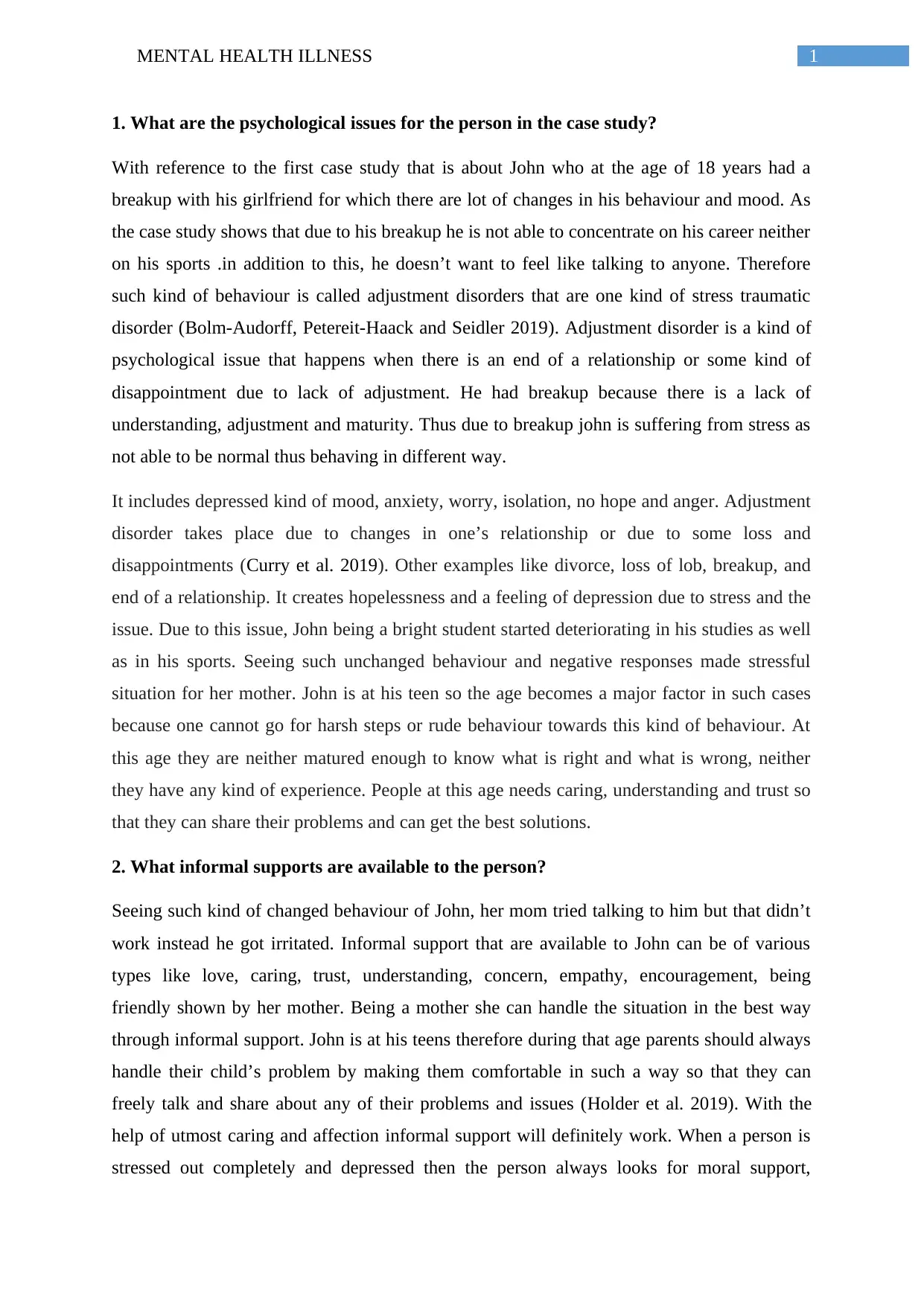
1MENTAL HEALTH ILLNESS
1. What are the psychological issues for the person in the case study?
With reference to the first case study that is about John who at the age of 18 years had a
breakup with his girlfriend for which there are lot of changes in his behaviour and mood. As
the case study shows that due to his breakup he is not able to concentrate on his career neither
on his sports .in addition to this, he doesn’t want to feel like talking to anyone. Therefore
such kind of behaviour is called adjustment disorders that are one kind of stress traumatic
disorder (Bolm-Audorff, Petereit-Haack and Seidler 2019). Adjustment disorder is a kind of
psychological issue that happens when there is an end of a relationship or some kind of
disappointment due to lack of adjustment. He had breakup because there is a lack of
understanding, adjustment and maturity. Thus due to breakup john is suffering from stress as
not able to be normal thus behaving in different way.
It includes depressed kind of mood, anxiety, worry, isolation, no hope and anger. Adjustment
disorder takes place due to changes in one’s relationship or due to some loss and
disappointments (Curry et al. 2019). Other examples like divorce, loss of lob, breakup, and
end of a relationship. It creates hopelessness and a feeling of depression due to stress and the
issue. Due to this issue, John being a bright student started deteriorating in his studies as well
as in his sports. Seeing such unchanged behaviour and negative responses made stressful
situation for her mother. John is at his teen so the age becomes a major factor in such cases
because one cannot go for harsh steps or rude behaviour towards this kind of behaviour. At
this age they are neither matured enough to know what is right and what is wrong, neither
they have any kind of experience. People at this age needs caring, understanding and trust so
that they can share their problems and can get the best solutions.
2. What informal supports are available to the person?
Seeing such kind of changed behaviour of John, her mom tried talking to him but that didn’t
work instead he got irritated. Informal support that are available to John can be of various
types like love, caring, trust, understanding, concern, empathy, encouragement, being
friendly shown by her mother. Being a mother she can handle the situation in the best way
through informal support. John is at his teens therefore during that age parents should always
handle their child’s problem by making them comfortable in such a way so that they can
freely talk and share about any of their problems and issues (Holder et al. 2019). With the
help of utmost caring and affection informal support will definitely work. When a person is
stressed out completely and depressed then the person always looks for moral support,
1. What are the psychological issues for the person in the case study?
With reference to the first case study that is about John who at the age of 18 years had a
breakup with his girlfriend for which there are lot of changes in his behaviour and mood. As
the case study shows that due to his breakup he is not able to concentrate on his career neither
on his sports .in addition to this, he doesn’t want to feel like talking to anyone. Therefore
such kind of behaviour is called adjustment disorders that are one kind of stress traumatic
disorder (Bolm-Audorff, Petereit-Haack and Seidler 2019). Adjustment disorder is a kind of
psychological issue that happens when there is an end of a relationship or some kind of
disappointment due to lack of adjustment. He had breakup because there is a lack of
understanding, adjustment and maturity. Thus due to breakup john is suffering from stress as
not able to be normal thus behaving in different way.
It includes depressed kind of mood, anxiety, worry, isolation, no hope and anger. Adjustment
disorder takes place due to changes in one’s relationship or due to some loss and
disappointments (Curry et al. 2019). Other examples like divorce, loss of lob, breakup, and
end of a relationship. It creates hopelessness and a feeling of depression due to stress and the
issue. Due to this issue, John being a bright student started deteriorating in his studies as well
as in his sports. Seeing such unchanged behaviour and negative responses made stressful
situation for her mother. John is at his teen so the age becomes a major factor in such cases
because one cannot go for harsh steps or rude behaviour towards this kind of behaviour. At
this age they are neither matured enough to know what is right and what is wrong, neither
they have any kind of experience. People at this age needs caring, understanding and trust so
that they can share their problems and can get the best solutions.
2. What informal supports are available to the person?
Seeing such kind of changed behaviour of John, her mom tried talking to him but that didn’t
work instead he got irritated. Informal support that are available to John can be of various
types like love, caring, trust, understanding, concern, empathy, encouragement, being
friendly shown by her mother. Being a mother she can handle the situation in the best way
through informal support. John is at his teens therefore during that age parents should always
handle their child’s problem by making them comfortable in such a way so that they can
freely talk and share about any of their problems and issues (Holder et al. 2019). With the
help of utmost caring and affection informal support will definitely work. When a person is
stressed out completely and depressed then the person always looks for moral support,
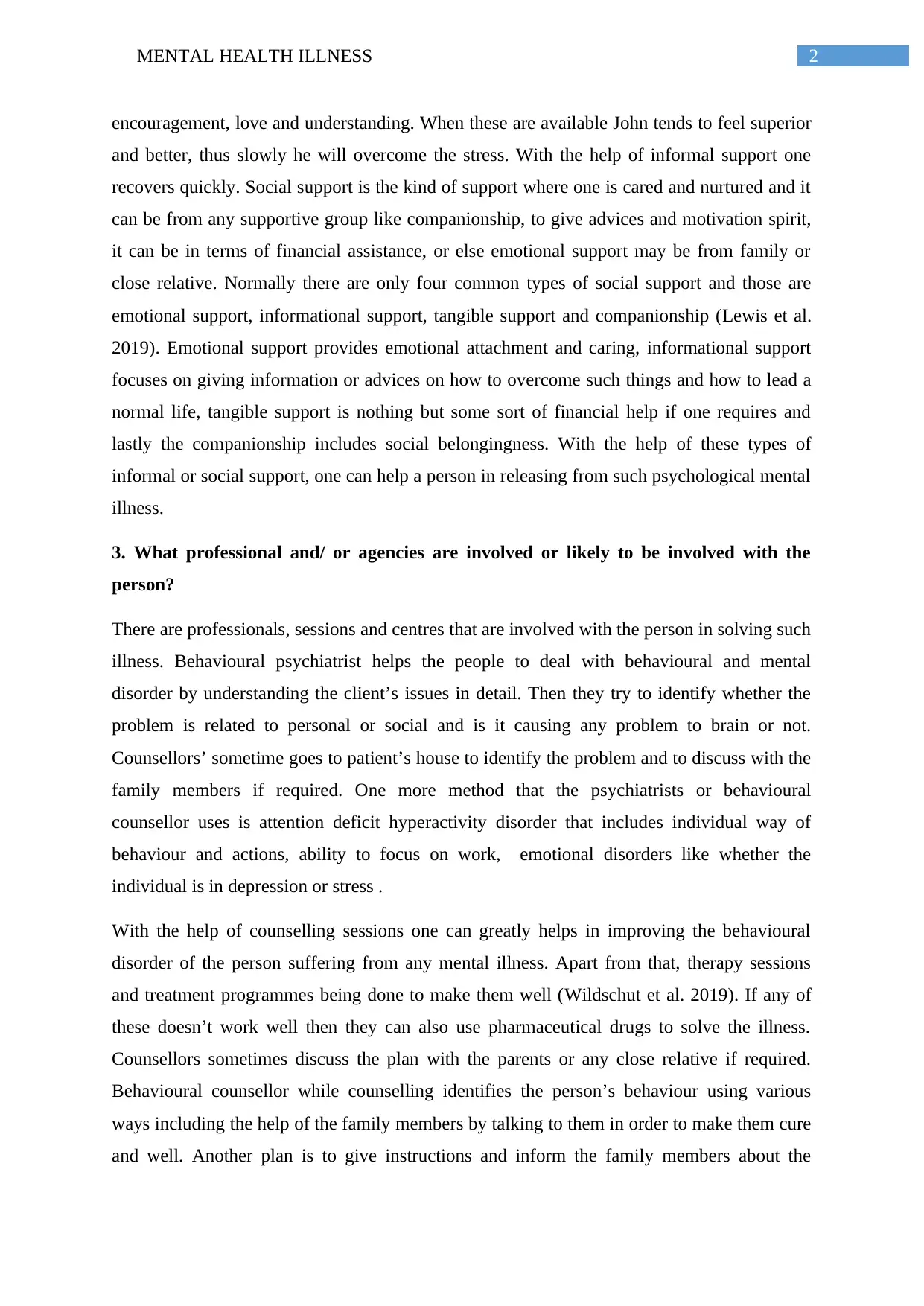
2MENTAL HEALTH ILLNESS
encouragement, love and understanding. When these are available John tends to feel superior
and better, thus slowly he will overcome the stress. With the help of informal support one
recovers quickly. Social support is the kind of support where one is cared and nurtured and it
can be from any supportive group like companionship, to give advices and motivation spirit,
it can be in terms of financial assistance, or else emotional support may be from family or
close relative. Normally there are only four common types of social support and those are
emotional support, informational support, tangible support and companionship (Lewis et al.
2019). Emotional support provides emotional attachment and caring, informational support
focuses on giving information or advices on how to overcome such things and how to lead a
normal life, tangible support is nothing but some sort of financial help if one requires and
lastly the companionship includes social belongingness. With the help of these types of
informal or social support, one can help a person in releasing from such psychological mental
illness.
3. What professional and/ or agencies are involved or likely to be involved with the
person?
There are professionals, sessions and centres that are involved with the person in solving such
illness. Behavioural psychiatrist helps the people to deal with behavioural and mental
disorder by understanding the client’s issues in detail. Then they try to identify whether the
problem is related to personal or social and is it causing any problem to brain or not.
Counsellors’ sometime goes to patient’s house to identify the problem and to discuss with the
family members if required. One more method that the psychiatrists or behavioural
counsellor uses is attention deficit hyperactivity disorder that includes individual way of
behaviour and actions, ability to focus on work, emotional disorders like whether the
individual is in depression or stress .
With the help of counselling sessions one can greatly helps in improving the behavioural
disorder of the person suffering from any mental illness. Apart from that, therapy sessions
and treatment programmes being done to make them well (Wildschut et al. 2019). If any of
these doesn’t work well then they can also use pharmaceutical drugs to solve the illness.
Counsellors sometimes discuss the plan with the parents or any close relative if required.
Behavioural counsellor while counselling identifies the person’s behaviour using various
ways including the help of the family members by talking to them in order to make them cure
and well. Another plan is to give instructions and inform the family members about the
encouragement, love and understanding. When these are available John tends to feel superior
and better, thus slowly he will overcome the stress. With the help of informal support one
recovers quickly. Social support is the kind of support where one is cared and nurtured and it
can be from any supportive group like companionship, to give advices and motivation spirit,
it can be in terms of financial assistance, or else emotional support may be from family or
close relative. Normally there are only four common types of social support and those are
emotional support, informational support, tangible support and companionship (Lewis et al.
2019). Emotional support provides emotional attachment and caring, informational support
focuses on giving information or advices on how to overcome such things and how to lead a
normal life, tangible support is nothing but some sort of financial help if one requires and
lastly the companionship includes social belongingness. With the help of these types of
informal or social support, one can help a person in releasing from such psychological mental
illness.
3. What professional and/ or agencies are involved or likely to be involved with the
person?
There are professionals, sessions and centres that are involved with the person in solving such
illness. Behavioural psychiatrist helps the people to deal with behavioural and mental
disorder by understanding the client’s issues in detail. Then they try to identify whether the
problem is related to personal or social and is it causing any problem to brain or not.
Counsellors’ sometime goes to patient’s house to identify the problem and to discuss with the
family members if required. One more method that the psychiatrists or behavioural
counsellor uses is attention deficit hyperactivity disorder that includes individual way of
behaviour and actions, ability to focus on work, emotional disorders like whether the
individual is in depression or stress .
With the help of counselling sessions one can greatly helps in improving the behavioural
disorder of the person suffering from any mental illness. Apart from that, therapy sessions
and treatment programmes being done to make them well (Wildschut et al. 2019). If any of
these doesn’t work well then they can also use pharmaceutical drugs to solve the illness.
Counsellors sometimes discuss the plan with the parents or any close relative if required.
Behavioural counsellor while counselling identifies the person’s behaviour using various
ways including the help of the family members by talking to them in order to make them cure
and well. Another plan is to give instructions and inform the family members about the
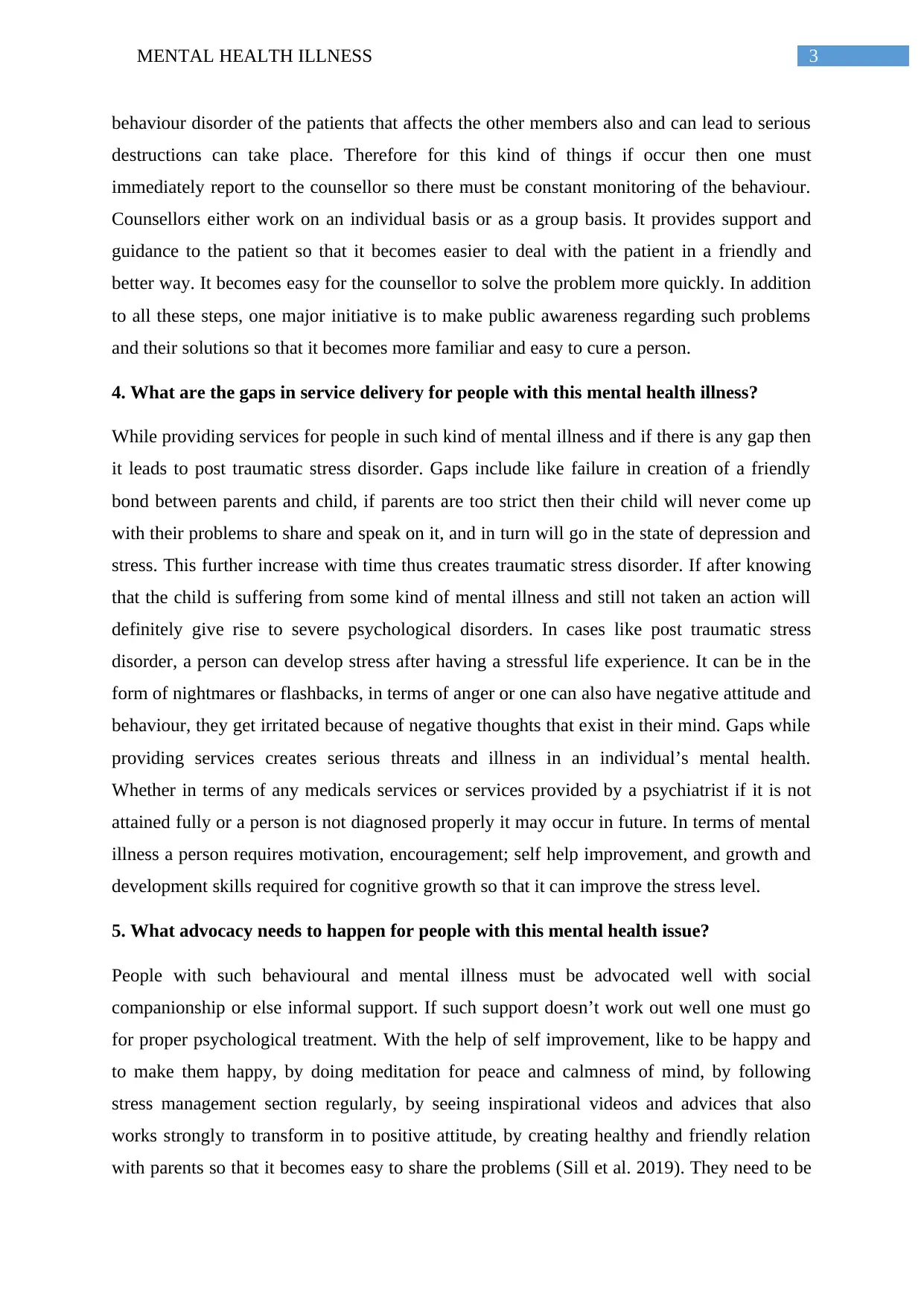
3MENTAL HEALTH ILLNESS
behaviour disorder of the patients that affects the other members also and can lead to serious
destructions can take place. Therefore for this kind of things if occur then one must
immediately report to the counsellor so there must be constant monitoring of the behaviour.
Counsellors either work on an individual basis or as a group basis. It provides support and
guidance to the patient so that it becomes easier to deal with the patient in a friendly and
better way. It becomes easy for the counsellor to solve the problem more quickly. In addition
to all these steps, one major initiative is to make public awareness regarding such problems
and their solutions so that it becomes more familiar and easy to cure a person.
4. What are the gaps in service delivery for people with this mental health illness?
While providing services for people in such kind of mental illness and if there is any gap then
it leads to post traumatic stress disorder. Gaps include like failure in creation of a friendly
bond between parents and child, if parents are too strict then their child will never come up
with their problems to share and speak on it, and in turn will go in the state of depression and
stress. This further increase with time thus creates traumatic stress disorder. If after knowing
that the child is suffering from some kind of mental illness and still not taken an action will
definitely give rise to severe psychological disorders. In cases like post traumatic stress
disorder, a person can develop stress after having a stressful life experience. It can be in the
form of nightmares or flashbacks, in terms of anger or one can also have negative attitude and
behaviour, they get irritated because of negative thoughts that exist in their mind. Gaps while
providing services creates serious threats and illness in an individual’s mental health.
Whether in terms of any medicals services or services provided by a psychiatrist if it is not
attained fully or a person is not diagnosed properly it may occur in future. In terms of mental
illness a person requires motivation, encouragement; self help improvement, and growth and
development skills required for cognitive growth so that it can improve the stress level.
5. What advocacy needs to happen for people with this mental health issue?
People with such behavioural and mental illness must be advocated well with social
companionship or else informal support. If such support doesn’t work out well one must go
for proper psychological treatment. With the help of self improvement, like to be happy and
to make them happy, by doing meditation for peace and calmness of mind, by following
stress management section regularly, by seeing inspirational videos and advices that also
works strongly to transform in to positive attitude, by creating healthy and friendly relation
with parents so that it becomes easy to share the problems (Sill et al. 2019). They need to be
behaviour disorder of the patients that affects the other members also and can lead to serious
destructions can take place. Therefore for this kind of things if occur then one must
immediately report to the counsellor so there must be constant monitoring of the behaviour.
Counsellors either work on an individual basis or as a group basis. It provides support and
guidance to the patient so that it becomes easier to deal with the patient in a friendly and
better way. It becomes easy for the counsellor to solve the problem more quickly. In addition
to all these steps, one major initiative is to make public awareness regarding such problems
and their solutions so that it becomes more familiar and easy to cure a person.
4. What are the gaps in service delivery for people with this mental health illness?
While providing services for people in such kind of mental illness and if there is any gap then
it leads to post traumatic stress disorder. Gaps include like failure in creation of a friendly
bond between parents and child, if parents are too strict then their child will never come up
with their problems to share and speak on it, and in turn will go in the state of depression and
stress. This further increase with time thus creates traumatic stress disorder. If after knowing
that the child is suffering from some kind of mental illness and still not taken an action will
definitely give rise to severe psychological disorders. In cases like post traumatic stress
disorder, a person can develop stress after having a stressful life experience. It can be in the
form of nightmares or flashbacks, in terms of anger or one can also have negative attitude and
behaviour, they get irritated because of negative thoughts that exist in their mind. Gaps while
providing services creates serious threats and illness in an individual’s mental health.
Whether in terms of any medicals services or services provided by a psychiatrist if it is not
attained fully or a person is not diagnosed properly it may occur in future. In terms of mental
illness a person requires motivation, encouragement; self help improvement, and growth and
development skills required for cognitive growth so that it can improve the stress level.
5. What advocacy needs to happen for people with this mental health issue?
People with such behavioural and mental illness must be advocated well with social
companionship or else informal support. If such support doesn’t work out well one must go
for proper psychological treatment. With the help of self improvement, like to be happy and
to make them happy, by doing meditation for peace and calmness of mind, by following
stress management section regularly, by seeing inspirational videos and advices that also
works strongly to transform in to positive attitude, by creating healthy and friendly relation
with parents so that it becomes easy to share the problems (Sill et al. 2019). They need to be
Secure Best Marks with AI Grader
Need help grading? Try our AI Grader for instant feedback on your assignments.
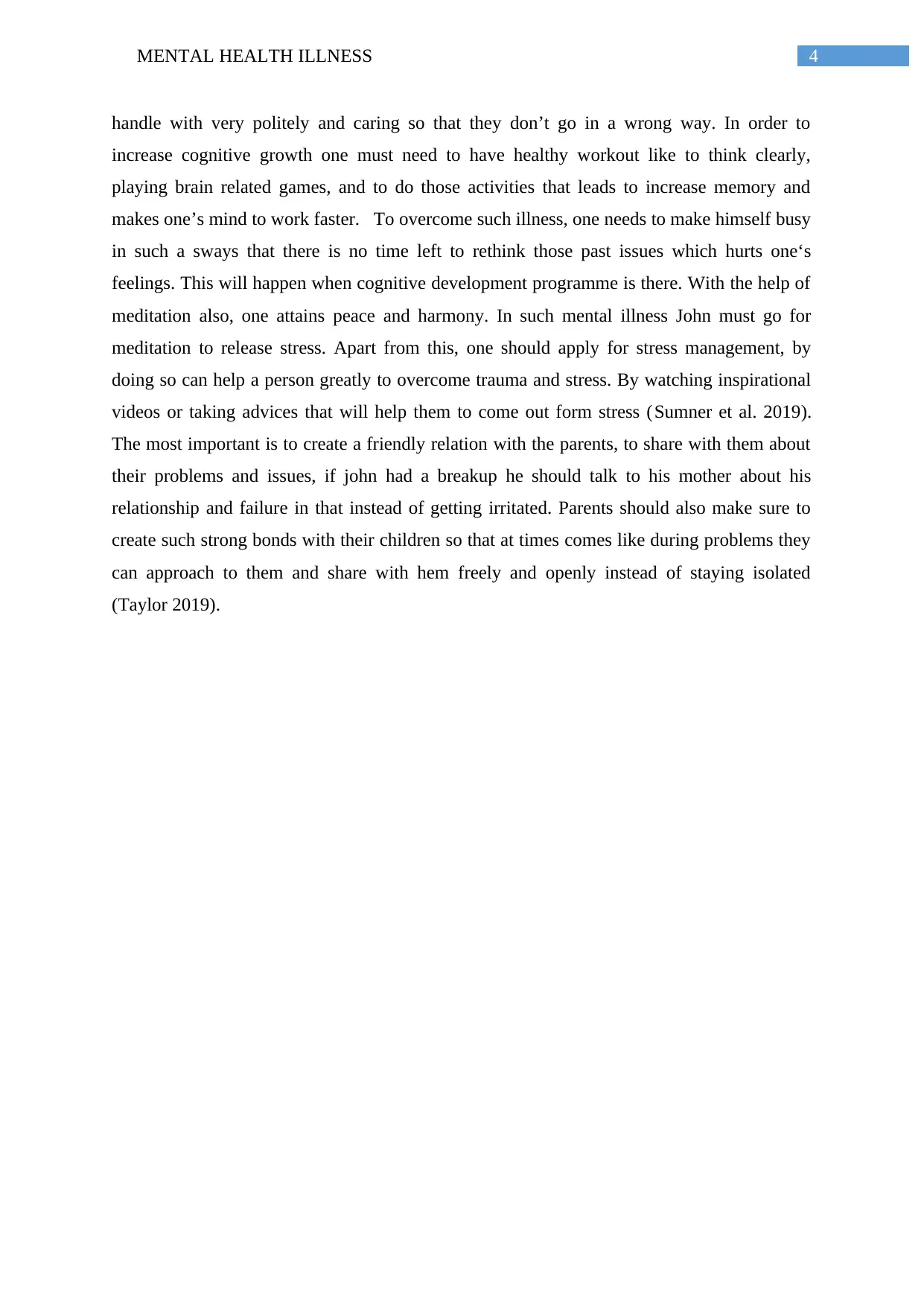
4MENTAL HEALTH ILLNESS
handle with very politely and caring so that they don’t go in a wrong way. In order to
increase cognitive growth one must need to have healthy workout like to think clearly,
playing brain related games, and to do those activities that leads to increase memory and
makes one’s mind to work faster. To overcome such illness, one needs to make himself busy
in such a sways that there is no time left to rethink those past issues which hurts one‘s
feelings. This will happen when cognitive development programme is there. With the help of
meditation also, one attains peace and harmony. In such mental illness John must go for
meditation to release stress. Apart from this, one should apply for stress management, by
doing so can help a person greatly to overcome trauma and stress. By watching inspirational
videos or taking advices that will help them to come out form stress (Sumner et al. 2019).
The most important is to create a friendly relation with the parents, to share with them about
their problems and issues, if john had a breakup he should talk to his mother about his
relationship and failure in that instead of getting irritated. Parents should also make sure to
create such strong bonds with their children so that at times comes like during problems they
can approach to them and share with hem freely and openly instead of staying isolated
(Taylor 2019).
handle with very politely and caring so that they don’t go in a wrong way. In order to
increase cognitive growth one must need to have healthy workout like to think clearly,
playing brain related games, and to do those activities that leads to increase memory and
makes one’s mind to work faster. To overcome such illness, one needs to make himself busy
in such a sways that there is no time left to rethink those past issues which hurts one‘s
feelings. This will happen when cognitive development programme is there. With the help of
meditation also, one attains peace and harmony. In such mental illness John must go for
meditation to release stress. Apart from this, one should apply for stress management, by
doing so can help a person greatly to overcome trauma and stress. By watching inspirational
videos or taking advices that will help them to come out form stress (Sumner et al. 2019).
The most important is to create a friendly relation with the parents, to share with them about
their problems and issues, if john had a breakup he should talk to his mother about his
relationship and failure in that instead of getting irritated. Parents should also make sure to
create such strong bonds with their children so that at times comes like during problems they
can approach to them and share with hem freely and openly instead of staying isolated
(Taylor 2019).
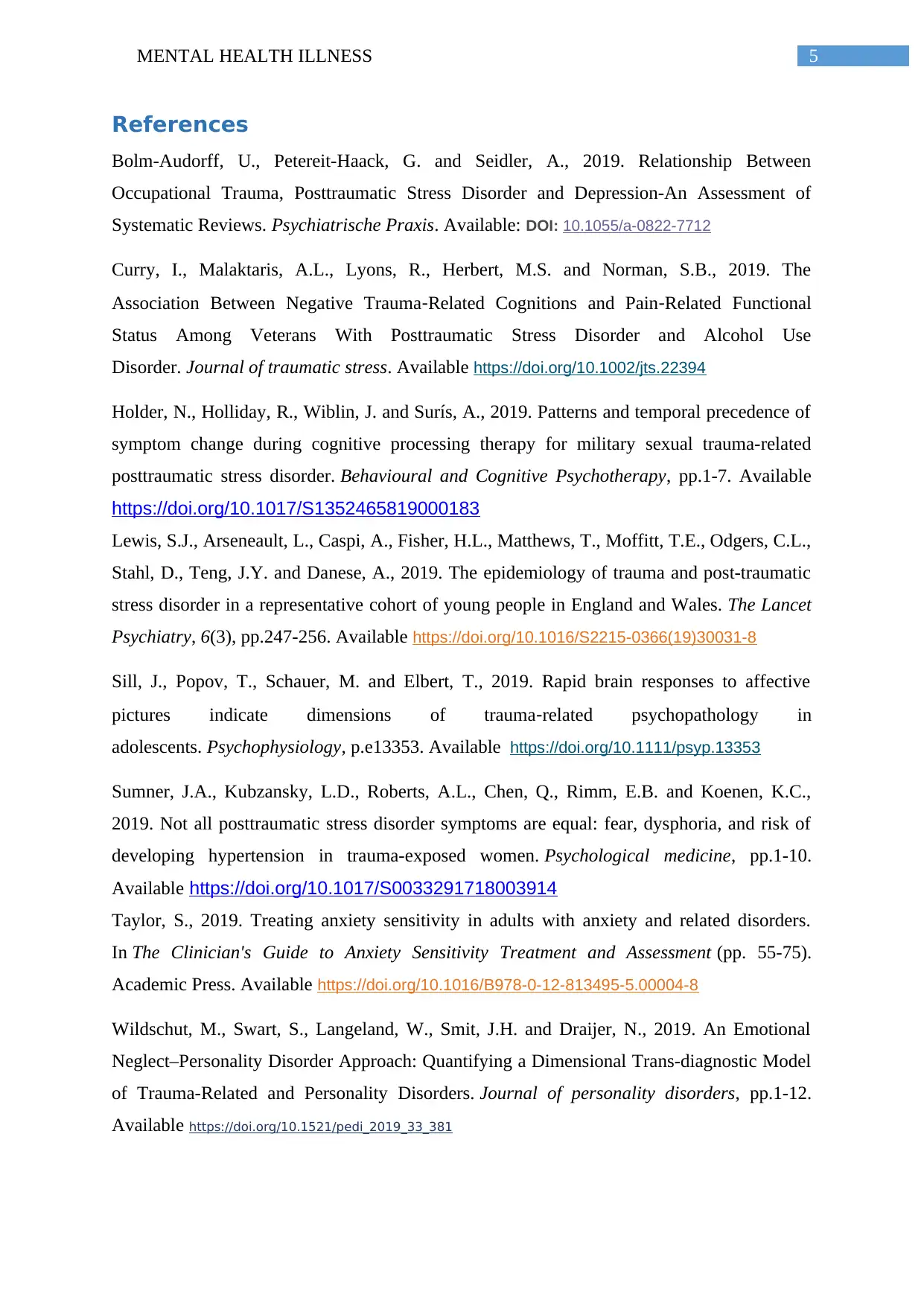
5MENTAL HEALTH ILLNESS
References
Bolm-Audorff, U., Petereit-Haack, G. and Seidler, A., 2019. Relationship Between
Occupational Trauma, Posttraumatic Stress Disorder and Depression-An Assessment of
Systematic Reviews. Psychiatrische Praxis. Available: DOI: 10.1055/a-0822-7712
Curry, I., Malaktaris, A.L., Lyons, R., Herbert, M.S. and Norman, S.B., 2019. The
Association Between Negative Trauma‐Related Cognitions and Pain‐Related Functional
Status Among Veterans With Posttraumatic Stress Disorder and Alcohol Use
Disorder. Journal of traumatic stress. Available https://doi.org/10.1002/jts.22394
Holder, N., Holliday, R., Wiblin, J. and Surís, A., 2019. Patterns and temporal precedence of
symptom change during cognitive processing therapy for military sexual trauma-related
posttraumatic stress disorder. Behavioural and Cognitive Psychotherapy, pp.1-7. Available
https://doi.org/10.1017/S1352465819000183
Lewis, S.J., Arseneault, L., Caspi, A., Fisher, H.L., Matthews, T., Moffitt, T.E., Odgers, C.L.,
Stahl, D., Teng, J.Y. and Danese, A., 2019. The epidemiology of trauma and post-traumatic
stress disorder in a representative cohort of young people in England and Wales. The Lancet
Psychiatry, 6(3), pp.247-256. Available https://doi.org/10.1016/S2215-0366(19)30031-8
Sill, J., Popov, T., Schauer, M. and Elbert, T., 2019. Rapid brain responses to affective
pictures indicate dimensions of trauma‐related psychopathology in
adolescents. Psychophysiology, p.e13353. Available https://doi.org/10.1111/psyp.13353
Sumner, J.A., Kubzansky, L.D., Roberts, A.L., Chen, Q., Rimm, E.B. and Koenen, K.C.,
2019. Not all posttraumatic stress disorder symptoms are equal: fear, dysphoria, and risk of
developing hypertension in trauma-exposed women. Psychological medicine, pp.1-10.
Available https://doi.org/10.1017/S0033291718003914
Taylor, S., 2019. Treating anxiety sensitivity in adults with anxiety and related disorders.
In The Clinician's Guide to Anxiety Sensitivity Treatment and Assessment (pp. 55-75).
Academic Press. Available https://doi.org/10.1016/B978-0-12-813495-5.00004-8
Wildschut, M., Swart, S., Langeland, W., Smit, J.H. and Draijer, N., 2019. An Emotional
Neglect–Personality Disorder Approach: Quantifying a Dimensional Trans-diagnostic Model
of Trauma-Related and Personality Disorders. Journal of personality disorders, pp.1-12.
Available https://doi.org/10.1521/pedi_2019_33_381
References
Bolm-Audorff, U., Petereit-Haack, G. and Seidler, A., 2019. Relationship Between
Occupational Trauma, Posttraumatic Stress Disorder and Depression-An Assessment of
Systematic Reviews. Psychiatrische Praxis. Available: DOI: 10.1055/a-0822-7712
Curry, I., Malaktaris, A.L., Lyons, R., Herbert, M.S. and Norman, S.B., 2019. The
Association Between Negative Trauma‐Related Cognitions and Pain‐Related Functional
Status Among Veterans With Posttraumatic Stress Disorder and Alcohol Use
Disorder. Journal of traumatic stress. Available https://doi.org/10.1002/jts.22394
Holder, N., Holliday, R., Wiblin, J. and Surís, A., 2019. Patterns and temporal precedence of
symptom change during cognitive processing therapy for military sexual trauma-related
posttraumatic stress disorder. Behavioural and Cognitive Psychotherapy, pp.1-7. Available
https://doi.org/10.1017/S1352465819000183
Lewis, S.J., Arseneault, L., Caspi, A., Fisher, H.L., Matthews, T., Moffitt, T.E., Odgers, C.L.,
Stahl, D., Teng, J.Y. and Danese, A., 2019. The epidemiology of trauma and post-traumatic
stress disorder in a representative cohort of young people in England and Wales. The Lancet
Psychiatry, 6(3), pp.247-256. Available https://doi.org/10.1016/S2215-0366(19)30031-8
Sill, J., Popov, T., Schauer, M. and Elbert, T., 2019. Rapid brain responses to affective
pictures indicate dimensions of trauma‐related psychopathology in
adolescents. Psychophysiology, p.e13353. Available https://doi.org/10.1111/psyp.13353
Sumner, J.A., Kubzansky, L.D., Roberts, A.L., Chen, Q., Rimm, E.B. and Koenen, K.C.,
2019. Not all posttraumatic stress disorder symptoms are equal: fear, dysphoria, and risk of
developing hypertension in trauma-exposed women. Psychological medicine, pp.1-10.
Available https://doi.org/10.1017/S0033291718003914
Taylor, S., 2019. Treating anxiety sensitivity in adults with anxiety and related disorders.
In The Clinician's Guide to Anxiety Sensitivity Treatment and Assessment (pp. 55-75).
Academic Press. Available https://doi.org/10.1016/B978-0-12-813495-5.00004-8
Wildschut, M., Swart, S., Langeland, W., Smit, J.H. and Draijer, N., 2019. An Emotional
Neglect–Personality Disorder Approach: Quantifying a Dimensional Trans-diagnostic Model
of Trauma-Related and Personality Disorders. Journal of personality disorders, pp.1-12.
Available https://doi.org/10.1521/pedi_2019_33_381
1 out of 6
Related Documents
Your All-in-One AI-Powered Toolkit for Academic Success.
+13062052269
info@desklib.com
Available 24*7 on WhatsApp / Email
![[object Object]](/_next/static/media/star-bottom.7253800d.svg)
Unlock your academic potential
© 2024 | Zucol Services PVT LTD | All rights reserved.





